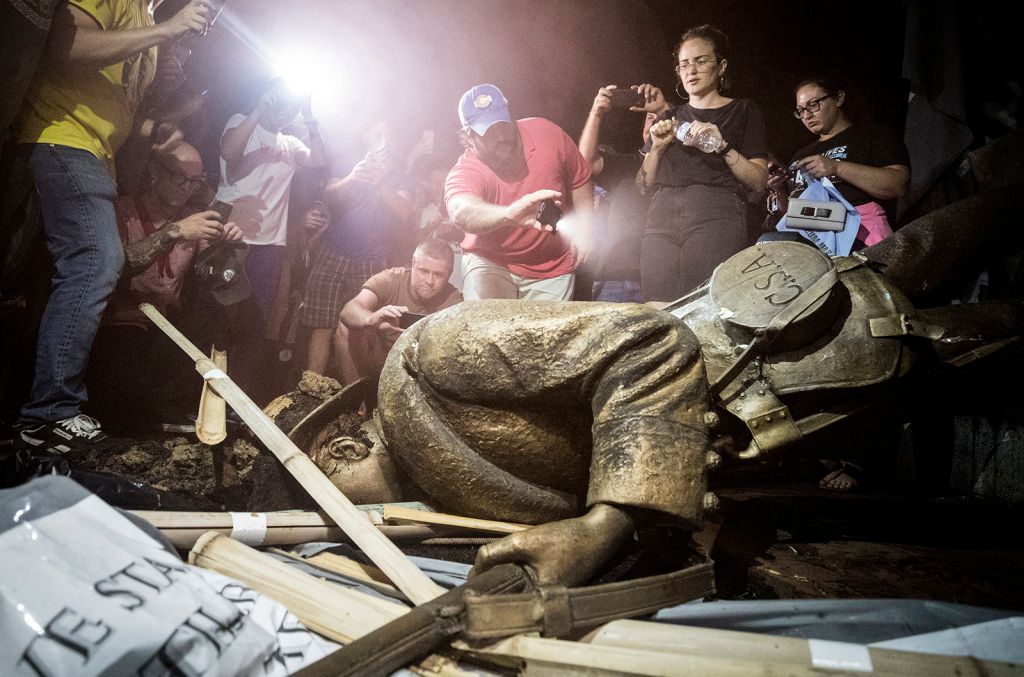
Source: Raleigh News & Observer / Getty
The University of North Carolina is facing major backlash for a plan to provide $2.5 million for the upkeep of a statue by a Confederate heritage group. Many officials are saying that the plan was not made aware to the public.
According to The Washington Post, North Carolina’s attorney general Josh Stein slammed the settlement that would turn over the Confederate statue known as “Silent Sam” to the North Carolina Division of the Sons of Confederate Veterans. He says his office played no part in negotiating the deal.
Stein’s comments come as the Lawyers’ Committee for Civil Rights Under Law challenged the legality of the court settlement university officials reached with the Confederate heritage group. “This is a matter of grave public interest,” the civil rights group wrote in a letter sent Wednesday to attorneys in the case and to Stein (D), including questions about adherence to ethical, legal and fiduciary duties by the university system’s board of governors.
“We’re approaching this with great urgency,” said Kristen Clarke, president and executive director of the civil rights group, because of “the fraud perpetrated on the court here. … The diversion of $2.5 million is money taken away from supporting students’ educations, and it fully supports and endorses the Sons of Confederate Veterans’ efforts to promote white supremacy. That is deeply troubling.”
University of North Carolina System leaders announced a resolution last month where a consent judgment had been reached to permanently remove the University of North Carolina at Chapel Hill campus of Silent Sam. It was given to the local chapter of the Sons of Confederate Veterans and the $2.5 million was provided by the university to fund an independent charitable trust to preserve the monument.
The commander of the veterans’ group, R. Kevin Stone, said he was ecstatic about the agreement at the time, but students protested the move and faculty condemned the settlement and the way it was carried out, including the fact that it was signed by a university official only days before the lawsuit from the veterans’ group was filed. Some folks even said they would prefer Silent Sam — which was toppled in 2018 by activists calling it a symbol of racism — be returned to campus rather than pay money that would benefit the group’s glorification of the Confederacy. Stone argues that his group doesn’t promote white supremacy.
A spokesperson for the North Carolina Department of Justice, Laura Brewer, said the state attorney general believes the $2.5 million for preservation of the statue “is an excessive amount of money that should instead be used to strengthen the university and support students.”
“Department of Justice lawyers played no role in negotiating the agreement,” Brewer wrote. “The Board of Governors hired outside counsel and negotiated this deal entirely on its own, sidelining our office.” The board of governors is over the state’s public universities. The department’s role was limited to advising the university and the state system on whether the settlement was legal, Brewer said.
Kevin M. Guskiewicz, an interim chancellor of UNC-Chapel Hill, released a public letter that he sent to the president of the state university system and to the board of governors chairman, laying out concerns he has heard on campus.
Guskiewicz told faculty that campus officials weren’t involved in the negotiations. In his letter Wednesday, he also mentioned that his understanding was that none of the funds in the charitable trust could be used for the benefit or activities of the local Sons of Confederate Veterans group unrelated to the upkeep of the statue.
“I join with others on my campus in stating that the values expressed by the [Sons of Confederate Veterans] are inconsistent with and antithetical to the values of the University,” Guskiewicz wrote.
He challenged the system leaders to ensure the money is used in compliance with terms of the settlement, and that system leaders consider providing more info to the UNC-Chapel Hill campus about the deal.
The settlement was “personally devastating,” explained Erika Wilson, an associate professor of law at UNC-Chapel Hill, “like pouring salt into a gunshot wound. The university is at a moral crisis point.”
SEE ALSO:
Leon Spinks’ Wife Asks For Prayers Amid Legendary Boxer’s Hospitalization
Jeffrey Epstein Wanted ‘Black Inmate’ For Protection, Jail Buddy Says















